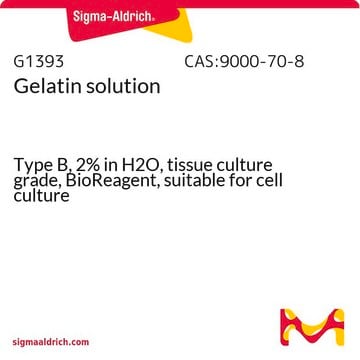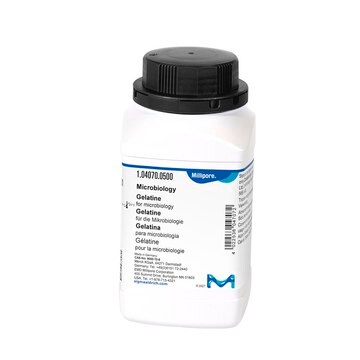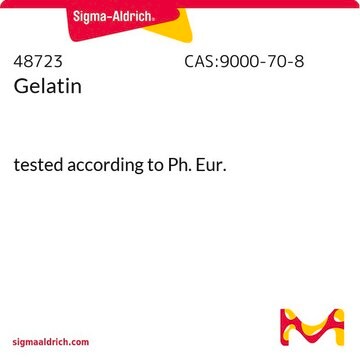G7041
Fish Gelatin
from cold water fish skin, powder, suitable for cell culture and generation of scaffolds.
Synonym(s):
Gelatine, Teleostean gelatin
About This Item
Recommended Products
product name
Gelatin from cold water fish skin, solid
biological source
fish skin
product line
BioReagent
form
solid
mol wt
60 kDa
packaging
pkg of 100 g
pkg of 500 g
technique(s)
cell culture | mammalian: suitable
surface coverage
100—200 μg/cm2
impurities
≤2% Residue on ignition (Ash)
≤20 ppm Heavy metals
solubility
acetic acid: soluble
glycerol: soluble
water: soluble
shipped in
ambient
storage temp.
room temp
Looking for similar products? Visit Product Comparison Guide
General description
Application
Biochem/physiol Actions
Storage Class Code
11 - Combustible Solids
WGK
nwg
Flash Point(F)
Not applicable
Flash Point(C)
Not applicable
Certificates of Analysis (COA)
Search for Certificates of Analysis (COA) by entering the products Lot/Batch Number. Lot and Batch Numbers can be found on a product’s label following the words ‘Lot’ or ‘Batch’.
Already Own This Product?
Find documentation for the products that you have recently purchased in the Document Library.
Customers Also Viewed
Articles
The extracellular matrix (ECM) and its attachment factor components are discussed in this article in relation to their function in structural biology and their availability for in vitro applications.
The extracellular matrix (ECM) and its attachment factor components are discussed in this article in relation to their function in structural biology and their availability for in vitro applications.
The extracellular matrix (ECM) and its attachment factor components are discussed in this article in relation to their function in structural biology and their availability for in vitro applications.
The extracellular matrix (ECM) and its attachment factor components are discussed in this article in relation to their function in structural biology and their availability for in vitro applications.
Protocols
This gelatin coating protocol for cell culture applications offers information regarding types of gelatin, surface coverage concentration, and tips for optimization.
Our team of scientists has experience in all areas of research including Life Science, Material Science, Chemical Synthesis, Chromatography, Analytical and many others.
Contact Technical Service












